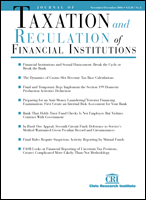Complete Issue
Author: Houman B. Shadab.
Source: Volume 28, Number 04, March/April 2015 , pp.1-56(56)

< previous article |return to table of contents
Abstract:
Cybersecurity is major problem and will likely impact a wide variety of financial institutions for the foreseeable future. The first article this issue, by John S. Servidio and Ryan D. Taylor, focuses on cybersecurity issues at community banks. As the authors note, due to their relatively small size, such banks may be particularly vulnerable to cyber attacks. They accordingly discuss how community bank management can take preventative and remedial measures to ensure their institution is safe from being hacked. In our second article, Stanley C. Ruchelman and Sheryl Shah examine the issue of base erosion and profit sharing (BEPS) that arises from tax law incentives for companies to structure transactions so that deductible interest expenses are incurred in high-tax jurisdictions and taxable interest income is earned in low-tax jurisdictions. The authors discuss reforms proposed by the Organisation for Economic Co-operation and Development that, if successful, would eliminate such tax benefits from structured financial products and consider the implications for banks and other institutions dependent on interest expenses deductions. As part of the regulatory reforms ushered in after the financial crisis, increasing the safety of derivatives became a major priority. In our third article, Julian E. Hammar, James E. Schwartz, and Michael R. Sorrell, Jr., provide a comprehensive overview of one important aspect of derivatives reform—margin requirements for uncleared swaps. The authors cover the rules proposed by U.S. bank regulators and the Commodity Futures Trading Commission, as well those from the Basel Committee on Banking Supervision, the Board of the International Organization of Securities Commissions, and the European Union. Importantly, they highlight critical differences among the various frameworks. In our State & Local column, John P. Barrie covers the ongoing dispute in South Dakota between Citibank and the state’s Department of Revenue over the bank’s claim to a tax refund of nearly $30 million. As Mr. Barrie explains, Citibank claims it is entitled to a refund because it timely filed its claim after the Internal Revenue Service approved a reduction in its taxable income. The state’s Department of Revenue, on the other hand, maintains that Citibank’s claim for a refund was made well past the applicable statute of limitations. This issue ends with a U.S./International column by George W. Madison, Holly J. Gregory, Connie M. Friesen, and Neil E. Horner, who review the corporate governance guidelines issued in October 2014 by the Basel Committee on Banking Supervision of the Bank for International Settlements. The authors recommend that banks begin now to take action based on the guidelines, as they will likely be incorporated in upcoming proposals by U.S. banking regulators.Keywords: cybersecurity; BEPS Action 4; profit shifting; intercompany transactions; covered swap entity; Citibank, N.A. v. South Dakota Department of Revenue; corporate governance principles for banks
Affiliations:
1: New York Law School.